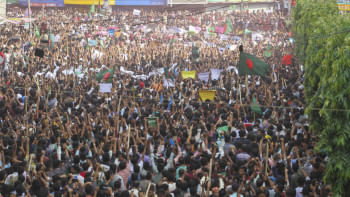MI Cement eyes expansion

MI Cement Factory that produces Crown brand cement has set a goal to become the top manufacturer of the construction material in Bangladesh in the next five years.
“To reach the target, we will go for expansion with necessary investment,” said Md Alamgir Kabir, additional managing director of MI Cement.
The company has a production capacity of 6,000 tonnes a day now. It has a plan to increase the capacity to 10,000 tonnes by December next year and to 16,000 tonnes by 2020.
MI Cement, which is among the top five cement companies in Bangladesh, aims to secure the number one position in terms of both production volume and market share, Kabir said.
“Quality will also be a major factor, as people are now concerned about quality and understand the components used in cement manufacturing,” he said.
MI Cement imports clinker, the basic raw material for cement manufacturing, from Japan, China and Thailand.
“We will set up our own clinker manufacturing plant by 2020,” he told The Daily Star in an interview on Tuesday.
The company will celebrate its 20th anniversary at Bangabandhu International Conference Centre in Dhaka today.
The company is also going to launch a new plastering product early next year in association with a Slovakian company.
MI Cement was incorporated in 1994, but it was mainly engaged in cement trading as a family business. “After realising that we can manufacture cement by ourselves, we started production in 2000 and launched our Crown brand in October that year,” Kabir said.
Though the company incurred losses in the first two years of production, they did not give up hope. A multinational company has also offered to buy the company at an attractive price in the meantime. “We thought that if the foreigners could run the business, why not us?”
They continued with the business and there was no looking back since then.
From a net profit of Tk 26 lakh in 2004-05, the company's net profit reached Tk 67.44 crore in 2013-14. However, the company's net profit fell to Tk 64.89 crore in 2014-15, mainly due to political unrest that affected businesses.
Political stability is a precondition for doing business, Kabir said. “Investment will rise if political stability is maintained.”
The company started with a manufacturing plant in West Muktarpur in Munshiganj with a capacity of only 600 tonnes a day.
As demand increased, sponsors had to expand capacity. The Crown brand cement was used in several big infrastructure projects. “We recently signed a deal with the authorities of the Padma bridge project, where our cement will be used,” said Kabir.
Because of good quality, Crown cement has also gained popularity in northeastern states of India; the company exports 55,000 tonnes of cement a year to India, the amount being half of the country's total cement export.
MI Cement, which directly employs 2,200 people, won the national export trophy (gold) for two consecutive years: 2008-09 and 2009-10. Myanmar is another potential export destination for Bangladeshi cement companies, Kabir said. “We are trying to enter the Myanmar market.”
With 32 cement manufacturing companies at present, the country has an installed production capacity of 3.2 crore tonnes a year; the local demand is around two crore tonnes, according to Bangladesh Cement Manufacturers Association (BCMA).
But Bangladesh's per capita cement consumption is only around 105 kilograms, which is 215kg in India, 310kg in Sri Lanka, 170kg in Pakistan, 320kg in Malaysia and 1,700kg in China. A vertical expansion of cities is the way to ensure the maximum utilisation of available space, said Kabir, also vice-president of BCMA.
Since its listing on the stock exchanges in 2011, MI Cement has been disbursing healthy dividends. The company gave 30 percent cash dividends for 2013-14. However, the recommended cash dividends for 2014-15 fell to 25 percent as the company's net profit declined during the period.
On the Dhaka Stock Exchange yesterday, each MI Cement share traded between Tk 84.70 and Tk 92.60, before closing at Tk 91.20.


 For all latest news, follow The Daily Star's Google News channel.
For all latest news, follow The Daily Star's Google News channel. 



Comments